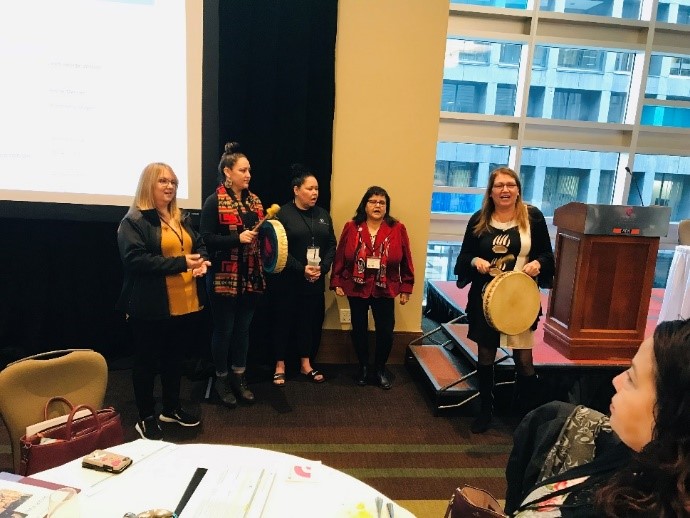
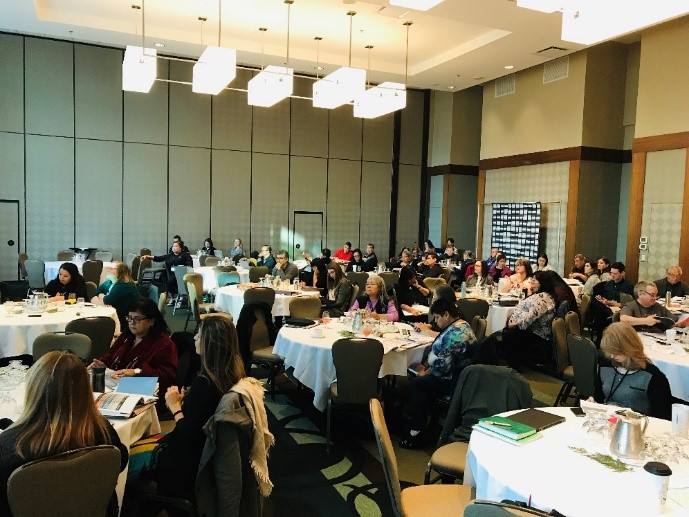
On Technical Day #1, two of the three health governance pillars, the First Nations Health Authority (FNHA) and First Nations Health Directors Association (FNHDA) collaborated on the opening session, jointly presenting on Community Health and Wellness Planning. The session began by honouring the unceded territories of the Musqueam, Squamish and Tsleil-Waututh Nations, with a traditional opening and song by Squamish Nation community leadership.
Taking place from November 19 – 22, 2018, at the Coast Coal Harbour Hotel, the Vancouver caucus was full of enthusiastic attendees who were highly engaged, and connected in powerful conversations about health service transformation. Equal access to care and the need for more robust health benefits for each Nation, were significant and recurring components of panel discussions and comments from the floor.
Acknowledging the amount of work yet to be done while reflecting on how far things have progressed in the last five years, the Traditional Knowledge Keepers, Chiefs, health leadership and other guest presenters balanced the mood with humour, generosity and recognition of all those working diligently to improve the lives and care of First Nations people. In addition to the participants and presenters, there were 6 Chiefs, 15 Members of Council, 10 Health Directors, 9 Community Health Reps and 7 Social Leads attending.
A Nation Based Approach – What Does It Mean?
Rosemary Stager, Health Director, Southern Stl'atl'imx Health Society and FNHDA Board Member, spoke about the decolonizing of healthcare and lateral kindness. "You have to start where you are, and we need to be patient with each other," Rosemary shared. Discussion among the delegates focused on the value of traditional healing practices and taking care of your health rather than waiting to get sick. Knowledge Keepers are now teaching these practices to youth in communities to bring back what has been lost in many places, and Rosemary expressed that it is a way to "get back to where our ancestors were."
Echoing these sentiments, and the emphasis on providing a new and tangible path for community designed programs that integrate traditional healing with available benefits and services, Richard Jock, COO of FNHA, addressed the Mental Health and Wellness MOU Funding implementation, and the 30 million dollars that will be used to support healthcare in communities. Nick Grant, ADM Strategic Policy Planning, with the Ministry of Mental Health and Addictions, underlined how they are working to find out "how we can do better", and what the needs are of each Nation. Questions from the floor centred on how to access funding and manage multiple contracts and MOUs.
Honouring Traditional Healing and Traditional Wellness at Caucus
Community leadership had the opportunity to take part in traditional healing and traditional wellness services in the Wellness Room, a carefully curated space next to the caucus site. Here, traditional wellness practitioners, traditional medicines and self-care services were available for all to learn about and experience.
On the first afternoon, Pow-Wow Dancers from Squamish Nation generously shared an energizing performance with Tyler Jacobs leading, Irvin Waskawitch drumming, and featuring five year old Sariah Jacobs-Greene, the 2018 Squamish Nation Pow-Wow Princess.
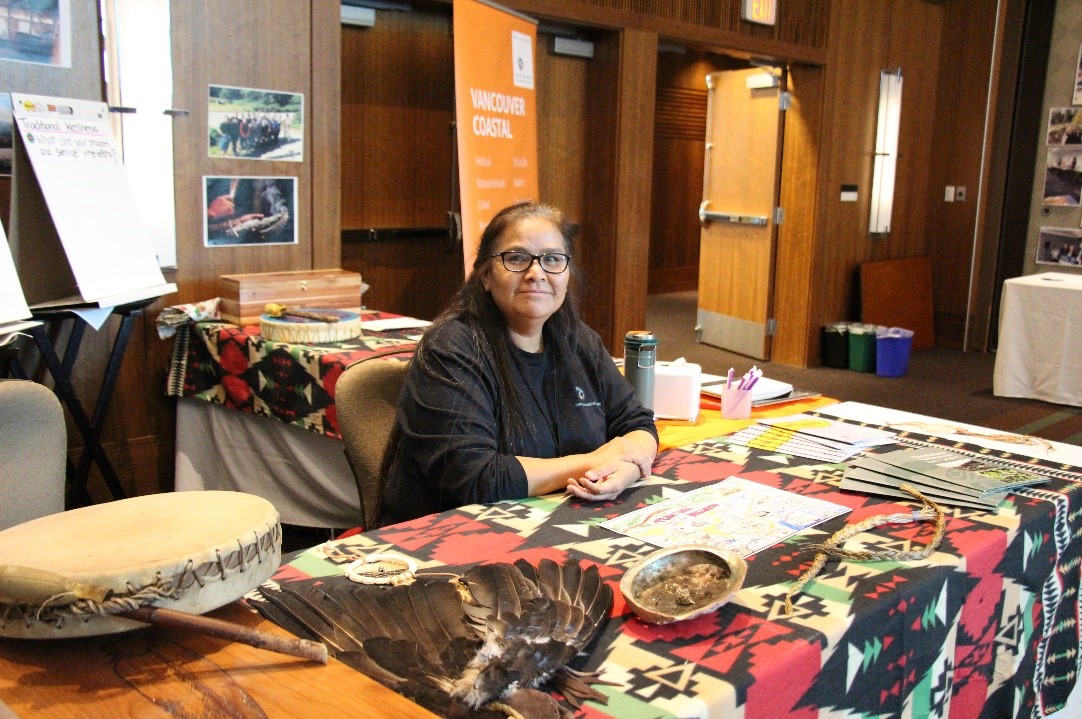
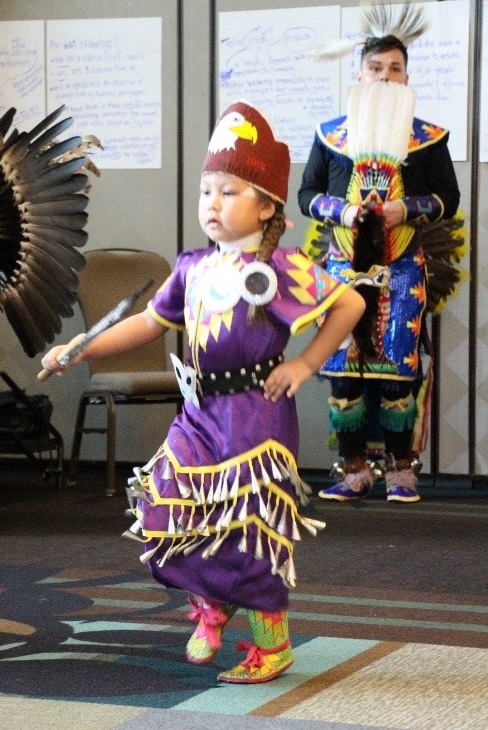
Reflecting on TransitionThere was passionate discussion about the transition of dental, vision, medical supplies and equipment benefits. Darren McKnight, Director, Benefit Management – Health Benefits, FNHA, spoke of the shift from "a sickness to a wellness model", and the assurance that the Health Benefits operations team will continue to support client concerns as they arise, encouraging anyone in need of assistance to call Health Benefits. The necessity for continued feedback and learning was also recognized, with Mr. McKnight sharing that there will be a specific Health Benefits evaluation through a separate, independent evaluator that will help guide the transition. Coreen Paul of the Musqueam First Nation acknowledged the work being done and commented, "I really feel that they are hearing us and we are moving forward a little bit at a time." Breakout groups explored specific needs for vision, dental and medical supplies in each of the regions.
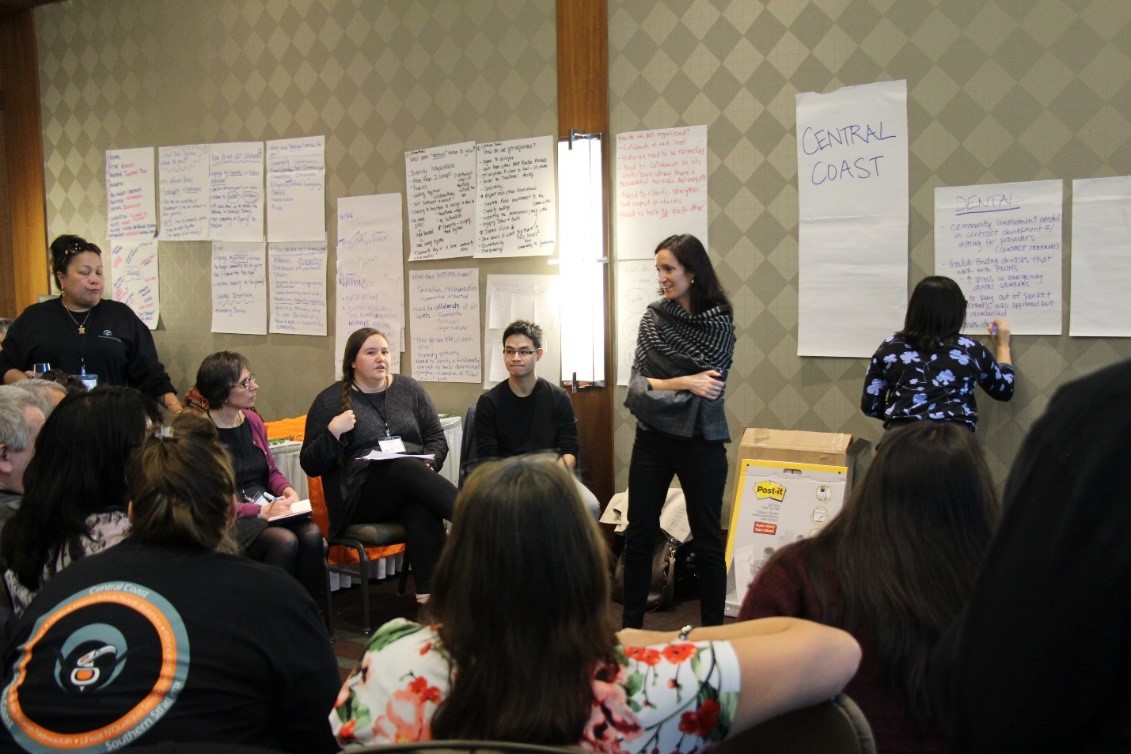
"Welcome to the Moment"
The second day of caucus started with a blessing by Traditional Knowledge Keeper, Shane Pointe, which grew into a ceremony to recognize and thank Naomi Williams for pulling the regional canoe, her ongoing contributions to the people, children and communities of the Vancouver Coastal First Nations, and to honour her work as acting regional director. It was a profound and moving moment as Shane expressed how "we are all one."
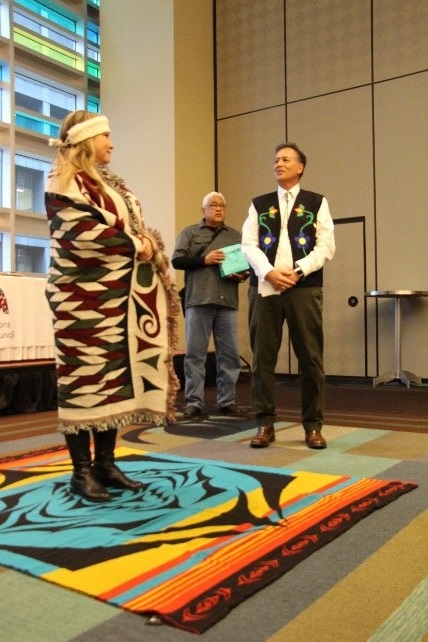
A New Approach to Create Solutions
Grand Chief Doug Kelly, FNHC Chair and Sto:lo Tribal Council Member, began day two of caucus talking about healthy, self-determining and vibrant communities and how the journey of healthcare will continue. Ernest Armann, Vancouver Coastal Caucus, Chair and FNHC Representative for Southern Stl'atl'imx, added that the MOU funding is to support Nation re-building saying, "If we do not rebuild our Nations we are going to lose sight of what is important – culture, language and heritage – and that is our job, to support communities. We need flexibility, and we have it in our funding. The journey of healing begins with us, and our role is service transformation. Our job is to remember who we are."
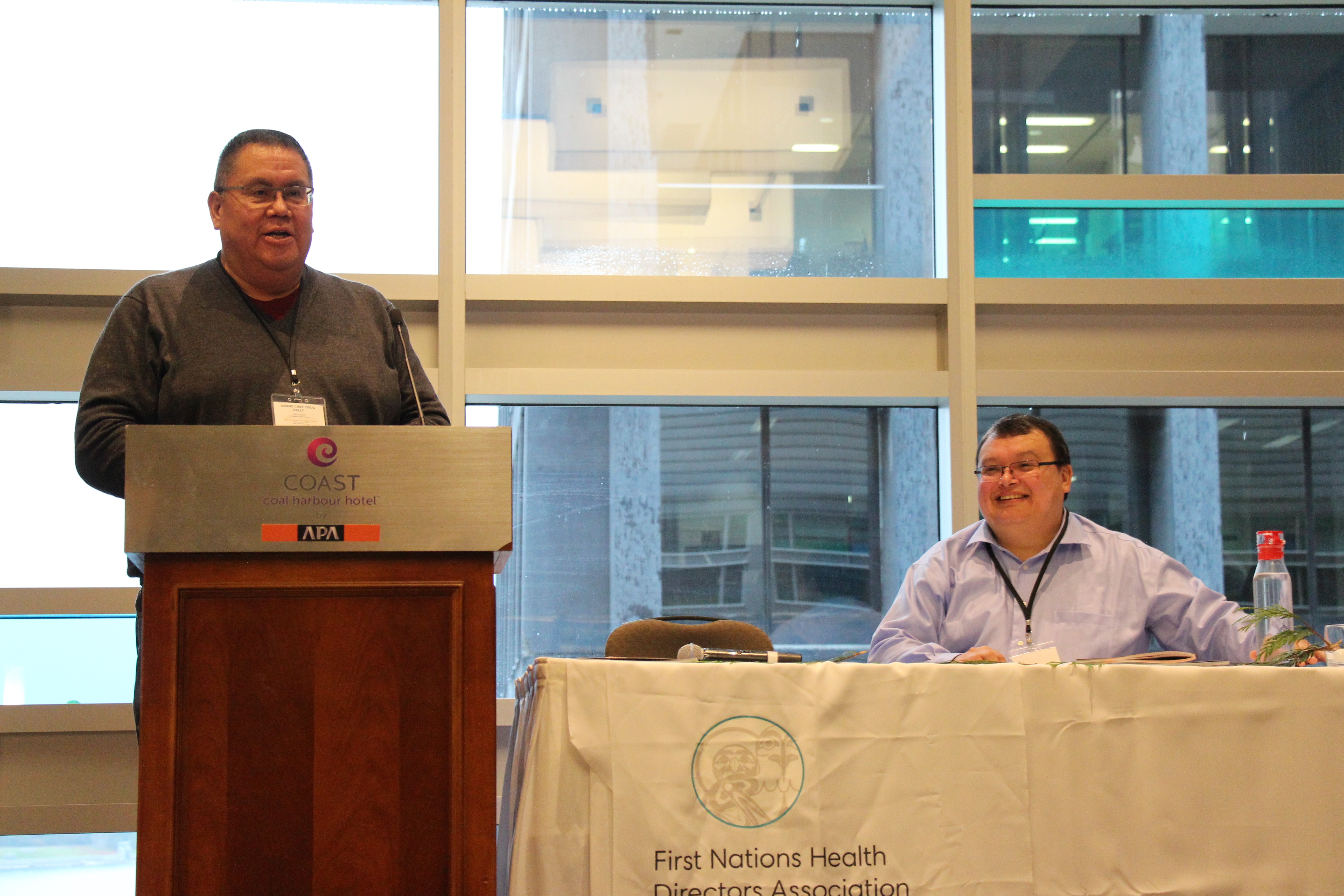
A Legacy of Resistance
Satsan Herb George provided a powerful overview on the historical struggle for recognition of aboriginal and treaty rights, the five pillars of inherent right to self-government, and the need to "transform back to where we should be." In speaking of the five pillars of governance; the people, the land, laws and jurisdictions, institutions and resources, Satsan echoed that "we were people of our own nations", and talked about the important role of symbolism in culture and identity. Asking for a symbolic gesture, Satsan asked everyone present in the room, "Do you believe in these five pillars of governance? Then stand up." The entire room rose to its feet in response, before shifting into breakout groups to brainstorm on what each pillar represents in community.
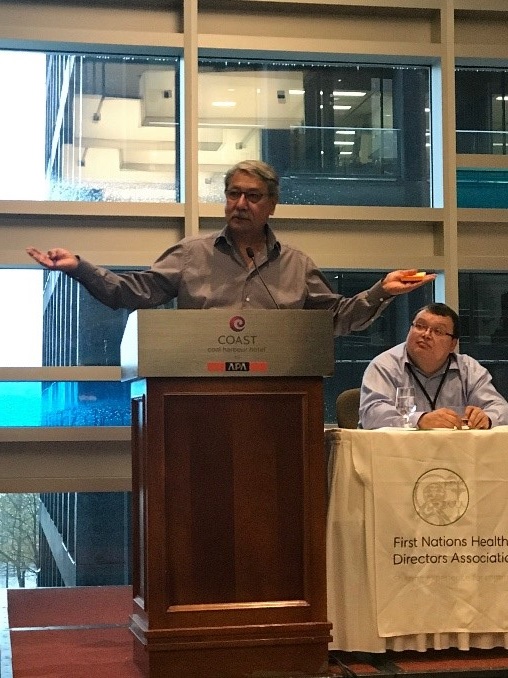
Cultural Sharing
The Kolus dancers, representing the Squamish and Kwakwaka'wakw Nations, performed on the second afternoon, led by Lason Taylor dancing and commanding the room at just six years old.
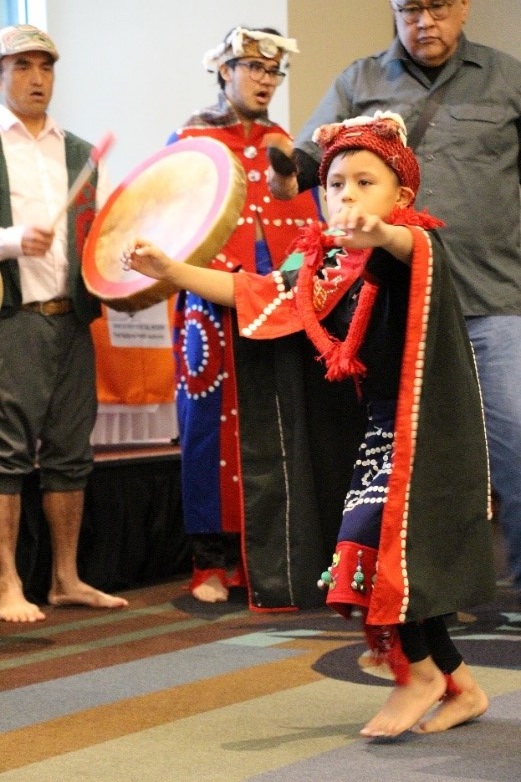
Honouring Community Governance Pathways
On Governance Day#2, a panel of Vancouver Coastal First Nations leadership shared about their self-determining transitional governance work and relationships. The panel included Chief Dean Nelson of Lil'wat Nation and Chief Warren Paul of Shishalh Nation.
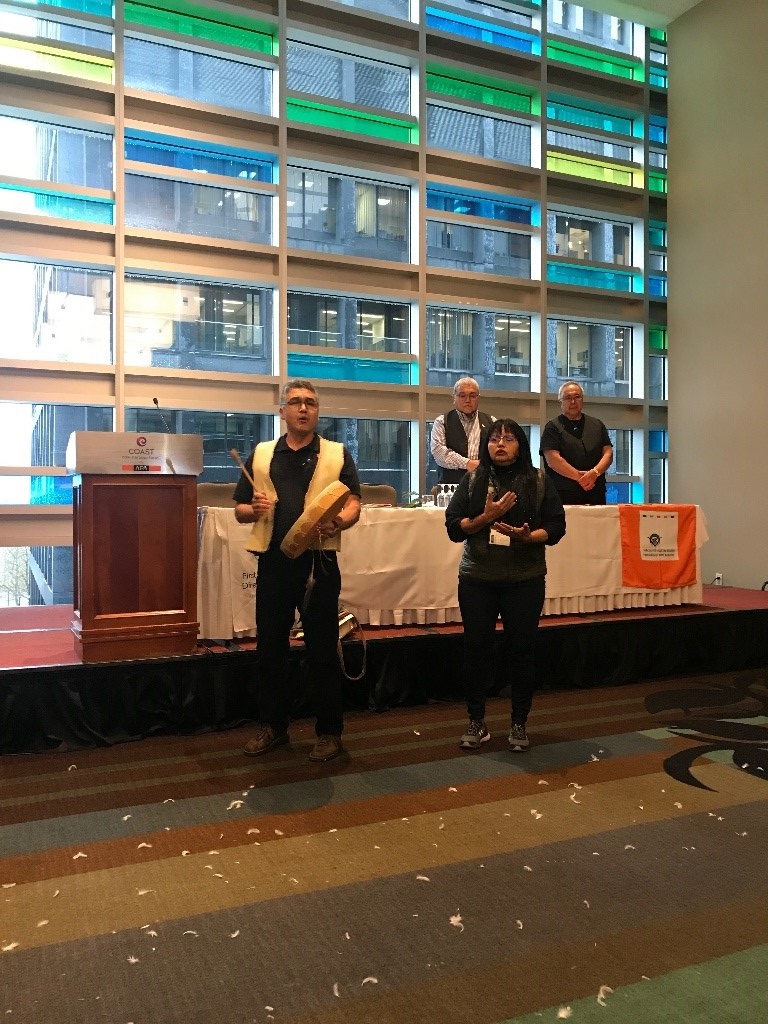
Cannabis Legalization and Regulation – There is Still Much to Learn
On Health Services Day#3, Dr. Nel Wieman, Senior Medical Officer, Mental Health and Wellness – OCMO, FNHA, opened and spoke about things to be aware of with the new legalization of cannabis, acknowledging that we are all still learning what legalization will mean to people and communities. Dr. Wieman talked about the FNHA's focus on youth and young and expectant mothers in the cannabis awareness campaign, and how cannabis use for these groups can be associated with increased risks and implications for mental health and wellness.
Dr. Shannon McDonald, FNHA Deputy Chief Medical Officer, added to what Dr. Wieman expressed, saying that the cannabis of today is genetically created and "not a natural product", and urged people to use their judgement when reading about cannabis online. "Educate yourself, exercise caution and bring a critical lens."
Health and Wellness Indicators
Together, Dr. McDonald and Grand Chief Doug Kelly talked about health and wellness indicators, and how the perceived quality of health services in the communities varied greatly. Comments and questions from attendees during the panel discussion strongly reflected this. As we collectively continue to move forward with a community driven and Nation based approach, Dr. McDonald posed an important question asking, "We need a way to measure the evolution that is community driven and Nation based. What you want to see is where we want to try and go. What do you want to take on as your priorities in your communities?"
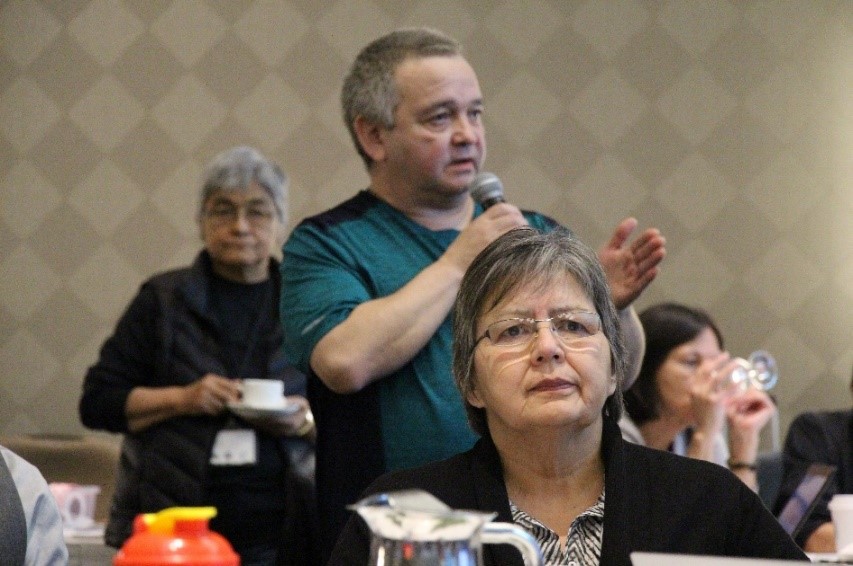
The office of the Provincial Health Officer (PHO) and FNHA together introduced a renewed set of indicators to be measured and reported on for the next ten years. Vancouver Coastal Health (VCH) will work to help with collecting data related to these wellness indicators. Juan Solorzano, Executive Director VCH, Population Health, stated about VCH's ability to help gather health information, "we can help with data collection, but it is FNHA's story to tell", acknowledging that this information will be used by FNHA to identify areas of greatest need and to prioritize improvements for health services in each community.
The Health and Wellness indicators framework shifts the paradigm toward strength-based reporting with attention given to root causes. In total, there are 15 Health and Wellness Indicators that were developed through a committee process between PHO and FNHA. Part of their work was narrowing down the list of indicators from 150 to the 15 highlighted within the framework.
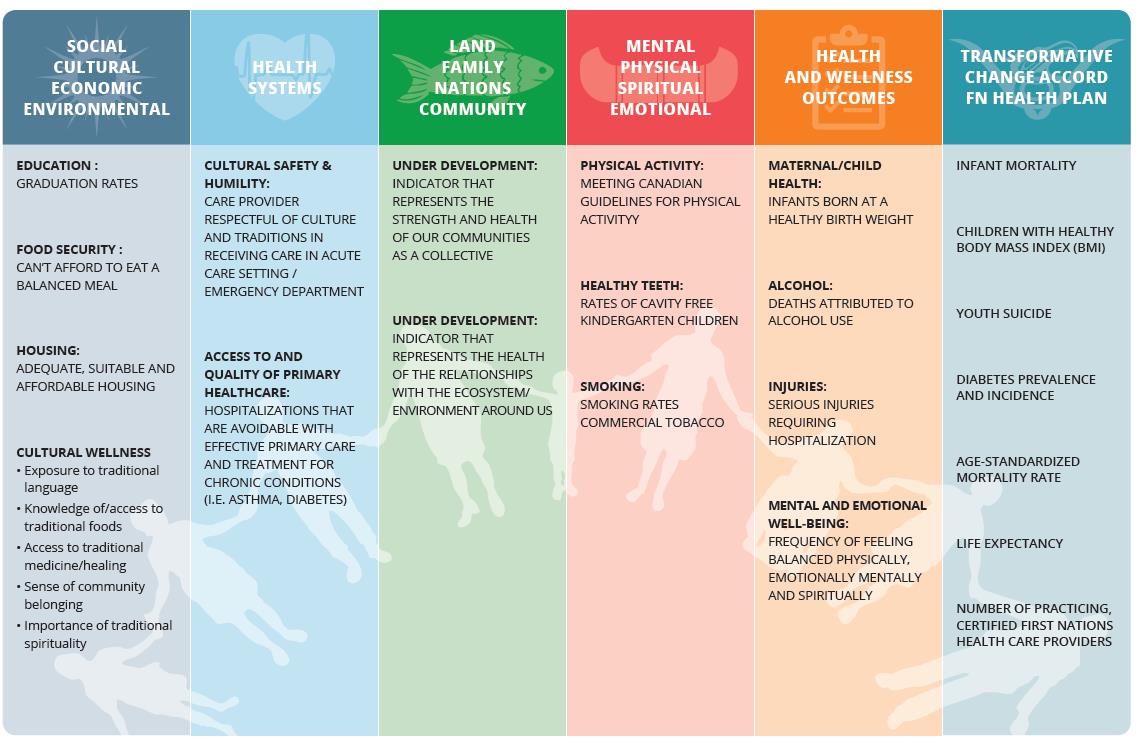
Grand Chief Doug Kelly spoke about "a belief in a better tomorrow" and shared how watching the young children dance during the cultural performances at caucus inspired him and gave him hope. "We will go a long way if we can create hope."
Honouring Community Wise Opioid Response Practices
Charmaine Thomas, Manager, Community Health and Wellness, Squamish Nation, discussed Squamish Nation's "Knock for Naloxone" initiative, the community health and wellness action plan developed in response to opioid overdose deaths in the community. Ms. Thomas noted that the statistics are very alarming, and that it is often a person's first time trying a drug when they overdose. A suggestion was made to put signs in front yards saying "Knock for Naloxone", so if there was an overdose anywhere in the community, someone could run outside to find a sign and knock on the door for help. Ms. Thomas concluded her presentation by noting that tragedy was a big motivator in this community. For those recovering, whether from alcohol or drugs, the reality hit close to home. Front line workers, managers and directors, were able to come together and bring the community out. The hope is that with time, the need for this initiative will fade.
Crystal Point, Community Health Nurse, Musqueam Nation, discussed the Musqueam Nation Town Hall Approach and reviewed a presentation titled, "Protecting Our People". Ms. Thomas noted that the Town Hall event aimed to decrease stigma, and to open conversations in a safe and non-judgemental space. Community members walked away with knowledge of the available resources, and an understanding that help is available to those who need it. Community members were inspired by the shared stories and increased support for each other.

